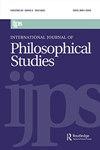责备是一种感情
IF 0.6
3区 哲学
0 PHILOSOPHY
INTERNATIONAL JOURNAL OF PHILOSOPHICAL STUDIES
Pub Date : 2022-05-27
DOI:10.1080/09672559.2022.2121893
引用次数: 0
摘要
指责的本质不能仅仅是一种判断、一种公开的行为或一种愤怒的情绪。相反,指责应该与情绪联系起来:更具体地说,是一种多轨性格,在一系列不同的情况下表现为各种不同的情绪、想法或行动。本文旨在为这两种主张辩护。我首先认为,指责不仅仅是一种判断、公开的行为或愤怒的情绪。然后我形成了这样一种观点,即指责是一种情绪。在这样做的过程中,我还展示了将指责视为一种情绪是如何避免反对意见的,从而证明我们有理由驳回之前的说法。此外,我认为这严重影响了其他关于指责的调查。最后,我回答了一个持怀疑态度的挑战,即不可能对责任进行有启发性和统一性的分析。本文章由计算机程序翻译,如有差异,请以英文原文为准。
Blame as a sentiment
ABSTRACT The nature of blame is not to be identified solely with a judgment, or an overt act, or an angry emotion. Instead, blame should be identified with a sentiment: more specifically, a multi-track disposition that manifests itself in various different emotions, thoughts or actions in a range of different circumstances. This paper aims to argue for these two claims. I start by arguing that blame is not solely a judgment, overt act, or an angry emotion. Then I develop the view that blame is a sentiment. In doing so, I also show how viewing blame as a sentiment avoids objections that justifies us in dismissing the previous accounts. In addition, I argue that it significantly affects other inquiries concerning blame. I end by answering a skeptical challenge that there cannot be an illuminating and unifying analysis of blame.
求助全文
通过发布文献求助,成功后即可免费获取论文全文。
去求助
来源期刊

INTERNATIONAL JOURNAL OF PHILOSOPHICAL STUDIES
PHILOSOPHY-
CiteScore
0.90
自引率
0.00%
发文量
29
期刊介绍:
The International Journal of Philosophical Studies (IJPS) publishes academic articles of the highest quality from both analytic and continental traditions and provides a forum for publishing on a broader range of issues than is currently available in philosophical journals. IJPS also publishes annual special issues devoted to key thematic areas or to critical engagements with contemporary philosophers of note. Through its Discussion section, it provides a lively forum for exchange of ideas and encourages dialogue and mutual comprehension across all philosophical traditions. The journal also contains an extensive book review section, including occasional book symposia. It also provides Critical Notices which review major books or themes in depth.
 求助内容:
求助内容: 应助结果提醒方式:
应助结果提醒方式:


